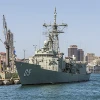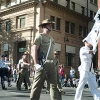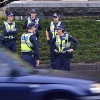42 careers found.
Forensic scientists apply scientific procedures and techniques to the examination of potential evidence that may assist in legal investigations. They can then advise courts and lawyers about the forensic details of an alleged crime.
Indigenous community liaison officers liaise with Indigenous communities and the state or territory police forces in order to establish and maintain positive relationships.
Intelligence analysts evaluate information from a variety of classified and unclassified sources. This information is often incomplete, contradictory and can vary widely in terms of reliability. Depending on their background and qualifications, an intelligence analyst may examine a diverse set of countries, issues (such as terrorism) and cultures. Intelligence analysts working for the Department of Defence specialise in a number of areas depending on their training, qualifications and agency employment.
Interpreters use their knowledge of languages and cultures to convert a spoken or signed language into another spoken or signed language, usually within a limited time frame and in the presence of the participants who need to communicate. Interpreters usually specialise in a particular language combination (French and English, for example) and may also specialise in a particular subject area, such as commerce, law, health, science, technology or welfare.
Judges preside over civil and criminal proceedings in courts of law, ensuring trials are run fairly and according to the rules of law and evidence.
Law clerks perform a variety of legal tasks under the supervision of solicitors, barristers or clerks of court. Law clerks may assist their employers in all areas of law, including probating (proving the validity of wills), conveyancing (dealings in land and property), criminal law, family law, wills and power of attorney, insurance law, environmental law, human rights law, company law and civil litigation.
Lawyers provide advice, write documents and conduct negotiations on legal matters, and may represent clients in court and tribunal proceedings. They are described as solicitors or barristers, depending on the work they do.
Machine shorthand reporters produce word-for-word transcripts of the spoken word in both live and recorded form for parliament, courts of law, medical purposes, television programmes, business conferences and lectures. Sound recording involves three stages: first, monitors record the proceedings using a digital audio recording system; then machine shorthand reporters transcribe the digital audio file onto a computer; and finally transcript checkers edit the hard copy of the transcript for accuracy against the audio.
Medical scientists conduct medical laboratory tests to provide information for diagnosing, treating and preventing disease. A medical scientist may specialise in haematology, immunology, transfusion science, clinical biochemistry, microbiology, histopathology, cytology, molecular genetics or virology.
Navy officers manage, lead, train and take responsibility for maintaining the team spirit and safety of the Navy's non-commissioned officers and sailors.
Navy sailors undertake a wide range of peacetime and wartime work on land and at sea, including communications, supply, seamanship, motor transport, combat systems operation, hospitality and stores.
Navy technical sailors are trained for peacetime and wartime work as electronic, marine and aviation specialists and in other technical areas.
Parking officers patrol on-street and off-street parking areas to ensure parking spaces and time allocations are shared among users, as required by law.
Police officers working for the Australian Federal Police (AFP) are responsible for policing federal law in all states and territories, and for community policing in the ACT and Australia's external territories. The AFP, with its headquarters located in Canberra, is Australia's international law enforcement and policing agency. It is the chief source of advice to the Australian Government on policing issues, enforces Commonwealth criminal law and protects Commonwealth and national interests.
Police officers protect the community from crime and disorder by providing services to uphold the law, protect life and property, preserve the peace, prevent crime, detect and apprehend offenders, and help those in need of assistance.











